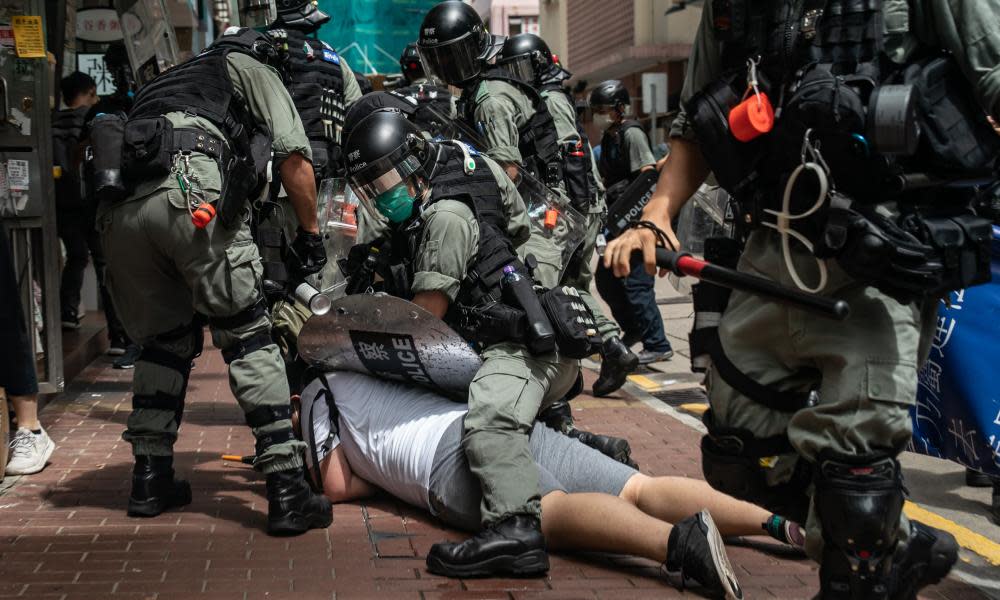Australia drafting plan to offer safe haven to Hong Kong residents, Scott Morrison says

Australia is working on a scheme to provide safe haven to Hong Kong residents after China’s “very concerning” decision to push ahead with the controversial new security law, Scott Morrison has said.
The Australian prime minister said on Thursday his country was “prepared to step up and provide support”, although his cabinet was yet to finalise the details, including whether the scheme would include a pathway to permanent settlement.
Morrison’s confirmation that Australia is set to follow the UK in providing support to fleeing residents comes a day after authorities arrested hundreds of protesters in Hong Kong.
In Hong Kong on Wednesday – the first full day of the Beijing-imposed national security law being in force – police fired teargas, pepper spray and water cannon at thousands of protesters.
Related: More Hongkongers apply to be refugees in Australia as security law passes
The law allows for the penalty of life imprisonment for the crimes of secession, subversion, terrorism and collusion with foreign forces. There have been suggestions that it may be interpreted as applying to anyone, whether they are a Hong Kong resident or not, or even those outside Hong Kong.
On Thursday Australia’s defence minister, Linda Reynolds, accused China of taking some actions that had “unsettled the stability of our region” and declared that Australia’s values were “non-negotiable”.
Morrison told reporters at a media conference he was disturbed by the developments in Hong Kong and was actively considering following Boris Johnson’s lead in offering safe haven.
He said the Australian government had consistently called for the upholding of Hong Kong’s basic law and the safeguards that were put in place with the handover from the UK to China in 1997.
“We do find these events very concerning and we have been very clear about our statements on that in concert with many other nations,” he said.
“We are considering [the issue] very actively and there are proposals that I asked to be brought forward several weeks ago and the final touches are being put on those and they’ll soon be considered by cabinet to provide similar opportunities.
“We think that’s important and very consistent with who we are as a people, and very consistent practically with the views that we have expressed.”
Asked whether the support would include permanent settlement, Morrison said he would announce the details once a final decision was made, but added: “If you’re asking are we prepared to step up and provide support, the answer is yes.”
There have been growing calls for Australia to provide assistance to Hongkongers who fear for their future under the new security laws. The UK has previously asked Australia and other partners to consider “burden-sharing if we see a mass exodus from Hong Kong”.
But the British foreign secretary, Dominic Raab, admitted on Wednesday that Britain could do little to “coercively force” China if it tried to block Hongkongers from taking up the UK government’s visa offer.
The leader of the Australian Greens, Adam Bandt, said on Thursday he was pleased to hear Morrison’s announcement and suggested that Australia’s trade deal with Hong Kong should also be reviewed.
Speaking to Guardian Australia early last month, Bandt called on Morrison to follow the lead of the former prime minister Bob Hawke “who after the bloody Tiananmen Square massacre showed tremendous compassion by opening Australia’s arms to Chinese people fleeing tyranny”.
Labor’s foreign affairs spokeswoman, Penny Wong, has also urged the government to “act with compassion” and consider help for Hongkongers.
In 1989, just after the Tiananmen massacre, Hawke surprised his colleagues by making an emotional announcement that extended all temporary entry permits for Chinese nationals legally in Australia for 12 months, with work rights and financial assistance. Eventually 42,000 were granted permanent visas.
Related: 'We saw humanity': a Chinese student on the day Bob Hawke wept over Tiananmen
And in 2015 Tony Abbott announced a special intake of 12,000 places – above and beyond the existing humanitarian program – for people displaced by the conflicts in Syria and Iraq.
Australia’s emerging offer to Hong Kong residents has the potential to add to tensions in its relationship with China – Australia’s biggest trading partner.
Reynolds gave a speech in Canberra on Thursday saying Australia had welcomed China’s pursuit of greater influence in the Indo-Pacific region “where that pursuit advances mutual interest in security, prosperity and stability”.
“And where such actions have unsettled the stability of our region, we have joined with others in clearly expressing our concerns,” she said.
China’s foreign ministry gave a relatively subdued response to Australia’s defence policy update, which foreshadows $270bn of spending on new and upgraded capability over the next decade – including the purchase of anti-ship missiles from the US.
“I’ll leave that to Australia,” the foreign ministry spokesman, Zhao Lijian, said when asked to comment on Australia’s defence policy at a briefing that was dominated by discussion of the developments in Hong Kong.
“All countries should avoid an arms race and refrain from purchasing unnecessary military equipment,” he said.

 Yahoo News
Yahoo News 
